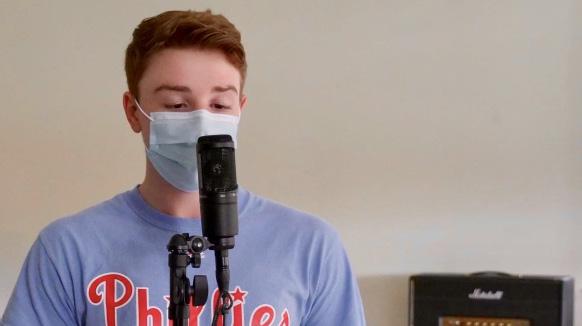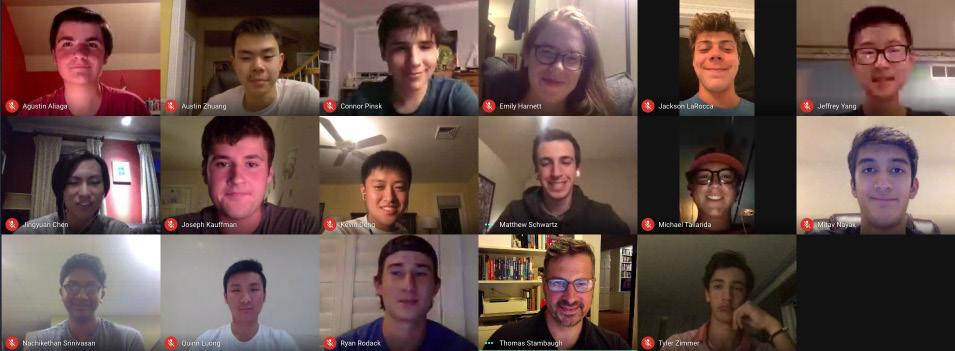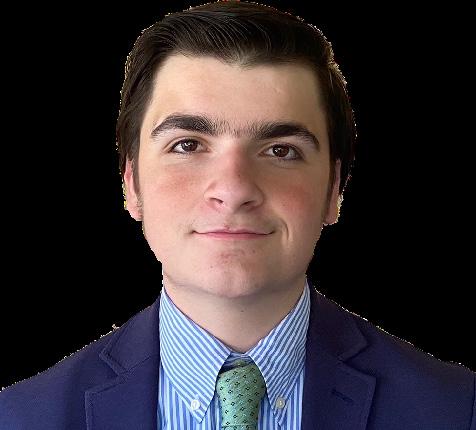the index · arts
Page 16
September 2020
arts Singing groups consider innovative rehearsal methods Mitav Nayak ’22
E
very winter and spring, students, faculty, family, and friends gather in Centennial Hall to listen to and support a collection of the school’s finest musicians. The two major singing groups, the Notables and Glee Club, anchor those events. Last year, these groups—like countless others—had their spring preparations cut short. While Mr. Mark Hightower digitally combined various Notables voices into an impressive song for the graduation video, both groups were unable to perform in front of the school in the spring. This year, they will utilize creative techniques to meet the school’s new policies. “What we are currently planning,” Mr. Hightower said, “is to have [four boys] come in and separate into four corners of a large room and spread out as far away as they possibly can with masks on.”
“[The new method] requires more musical independence, confidence, and talent” MR. MARK HIGHTOWER
While these quartets are going to be very different from the Notables’ rehearsals last year, Mr. Hightower is optimistic. “It actually works really well because we typically rehearse in sectionals that are basically quartets, with four guys singing the same part,” Mr. Hightower said. “Then, we put everyone together and we rehearse as a full group. [The new method] requires more musical independence, confidence, and tal-
MR. MARK HIGHTOWER
Ben Fosnocht ’21 records his portion of the opening assembly on Tuesday, September 1, 2020 ent to be the only person singing your part in a mixed quartet, but I see it potentially working assuming we stay in school and everything goes well.” Fifth Former and Notables member Damian Ferraro had similar views. “It’s basically going to be [two tenors], one bass, and one baritone in the mixed quartet. Then, if we wanted to record something, we could have each quartet sing and combine those audios together,” Ferraro said. Additional innovative solutions have arisen from the difficulties associated with wearing traditional masks to sing. Ferraro said, “[Mr. Hightower] recommended this singing mask which is like a regular mask, but it’s got a bit more space. We’ve also considered going outside to rehearse and sing.”
Sixth Form Notables member Decker Patterson said, “With the standard masks, you get it right in front of your face so you don’t get that much air-flow. With the singing masks, you get a lot of air-flow, but the difference is that it is hot.” Mr. Hightower plans to experiment with his various rehearsal methods for the Notables and adjust as needed. For the Glee Club, which has approximately 76 students enrolled this year, he is working on another plan. “I’m considering offering virtual alternative programming and doing a sort of deep dive into an interesting piece of music,” Mr. Hightower said. “We were thinking about the musical Hamilton . . . we could offer a music class where we could study themes, rhythm, and harmony of Hamilton.”
The large numbers of students in Glee Club will likely result in a mostly virtual program this year. However, because the Notables have considerably fewer students, they hope they will be able to establish as much normalcy as possible under current circumstances and stay together as a group. “The cool thing about the Notables is that people come from all different facets of the school,” Ferraro said. “But we all have this common goal of making music and entertaining people through our musical talents, and I think that’s something that is special about a group like that.” Patterson said, “We’re already so close-knit and devoted to the Notables, so I think that is what will get us through and keep the Notables alive this year.”
Netflix’s unusual I’m Thinking of Ending Things Joey Kauffman ’23
“A
screenplay is an exploration. It’s about the thing you don’t know. To step into the abyss.” - Charlie
Kaufman I’m Thinking of Ending Things, written and directed by Charlie Kaufman and re-
VIA WIKIMEDIA COMMONS
I’m Thinking of Ending Things
leased on Netflix on September 4, is many things, but it is one thing especially—a step into the abyss. The movie is ostensibly about a young woman who visits her boyfriend’s parents in rural Oklahoma during the dead of winter, yet, throughout the film, I wasn’t sure what was happening. There are strange noises, sudden shifts and contradictions in the lives of the characters, and a disregard for chronology or even the very idea of time itself within the movie. We see things that don’t make sense, and there’s no catch, no “it was all a dream!” It doesn’t make sense, yet on a certain level, it doesn’t have to. The film is shot beautifully, and it feels as though meticulous effort went into each shot, line of dialogue, and plot point. However, the movie is startling; it doesn’t follow any formula or convention found in most films. There is no inciting incident, no climax, and no resolution. There are simply people—people who struggle, people who grow—but at their core, just people, not pawns in a story arc. The actors in the movie are, in short, terrific. I almost didn’t notice the actors’ performances at all. Why? Because they
didn’t feel like performances; they felt like life. This is much easier said than done. I’m sure many movies strive for authentic-feeling characters, yet few actors ever feel that way on screen. Toni Collette and David Thewlis, who play the parents in the film, portray strange characters themselves, yet they never feel overly dramatic or forced. Also, Guy Boyd, who plays the janitor, has a smaller role in the movie, yet he delivers a surprisingly emotional performance that strangely ties the film together.
“Say who you are. Really say it in your life and in your work.” CHARLIE KAUFMAN
The quote at the beginning of this review is from the BAFTA Screenwriters’ Lecture Charlie Kaufman gave in 2011. In that lec-
ture, Kaufman talked about why he makes movies. “Say who you are. Really say it in your life and in your work,” Kaufman said. “Give that to the world rather than selling something to the world.” For better or worse, Kaufman says who he is in his work. His movies can be confusing, self-centered, and neurotic, but that’s because he is all of those things, as indeed all of us are. In I’m Thinking of Ending Things, which Kaufman adapted from a novel of the same name by Ian Reid, Kaufman creates a story that is mercilessly tiring but is, in the end, a truly heartwarming and hopeful movie. He uses the cinematic landscape of a film—the camera movement, the music, the lighting— to evoke all that makes us human, creating a truly moving experience for the viewer that reminds us why movies are such a great platform to tell stories. To those who are reluctant to watch a film described as tiring, I say give it a chance. Don’t judge it because it’s confusing. I’m Thinking of Ending Things, when all is said and done, is a beautiful work, and beauty doesn’t need to make sense to be true.




